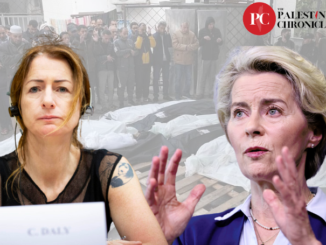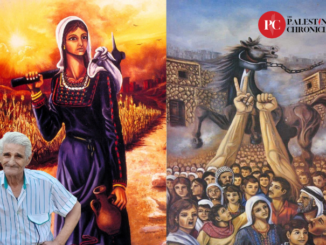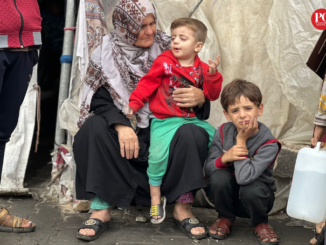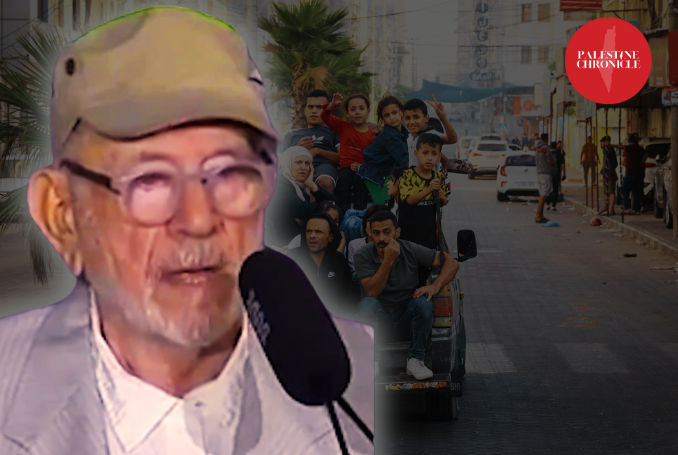
The Palestine Chronicle and Brazilian newspaper A Nova Democracia interviewed renowned Argentine-Jewish filmmaker Norman Briski about the essence of solidarity with the Palestinian people. ‘A true Jew will defend the Palestinian people’, he said.
On October 24, the renowned Argentine-Jewish filmmaker Norman Briski stunned the audience at the Martín Fierro Film Prize with a powerful speech about Palestine.
“Gaza, Gaza, Gaza. Gaza will never be defeated!” he declared to the packed auditorium and the cameras recording the event.
“I don’t care if they applaud me a lot or a little, but I feel here in my blood, in my ancestors, my solidarity with a people who are being murdered,” continued the 86-year-old director, whose illustrious career in cinema has spanned decades.
Briski’s speech sparked a wave of persecution against him, though the support and solidarity he received far outweighed the backlash. Artists and activists quickly organized campaigns in his defense, standing firmly by the moral position of the filmmaker.
In a joint interview with The Palestine Chronicle and Brazilian newspaper A Nova Democracia, Briski elaborated on the motivation behind his strong solidarity with the Palestinian people. He emphasized that those who fight for freedom today “must be Palestinians” and drew connections between the anti-imperialist struggles in Latin America and the current Palestinian resistance.
‘A True Jew Will Defend the Palestinian People’
During your speech, you emphatically declared that Gaza will never be defeated. Why are you so sure of this?
Because it is a cause of the righteous. And because of the solidarity shown by students across the world and by many individuals, including those from the pro-Palestinian Jewish community.
The idea that what’s happening is genocide has already been widely accepted. Of course, a true Jew will defend the Palestinian people in their pursuit of peace and harmony—a coexistence between two peoples who have historically lived together and enriched each other’s cultures.
❝Gaza, Gaza, Gaza. Gaza will never be defeated. It doesn't matter if you applaud me more or less, but I felt it in my blood❞
Jewish-origin Argentinian actor Norman Briski made a speech on Gaza at an award ceremony
pic.twitter.com/IeOnuaZ6xl
— Anadolu English (@anadoluagency) October 23, 2024
You also praised other struggles around the world. How do you see the relationship between the Palestinian struggle and the Latin American fights against colonialism and imperialism?
Today, we have to be Palestinians. Just as we must be Mapuche if we are Argentine, or Black if we face the inequalities endured by Black people in the United States. We must align ourselves with every emancipatory struggle against oppression.
It is the duty of anyone committed to liberation—or why not call it revolution—to stand alongside those fighting for freedom from domination.
In Argentina, we currently have a president who is openly pro-Israel. During your speech, you mentioned living in a “fictionalized” reality, with Javier Milei in the Casa Rosada. What did you mean by that, and how do you see Milei’s stance on the war in Palestine?
This economic model being pursued in Argentina has failed everywhere else in the world. It reflects a stage where civil complicity supports a bourgeois or dependent project—one that carries another country’s flag.
Right now, we’re essentially in a colonial state again. It’s not the first time, and without resistance, it won’t be the last. Imperialism has only one objective: expansion, as we see in Syria and across the Middle East.
Having a government driven by fiction, one that uses genocidal policies as an economic solution, means we are living in barbarism. And yet, they deny us even the means to foster national cinema—cinema that once nurtured new projects and ideas for a popular, people-centered narrative.
Role of the Intellectual
What role do intellectuals and artists play in resisting genocide in Palestine? Are they morally responsible for participating in movements for change?
The historical role of intellectuals in popular struggles isn’t exactly inspiring, is it? There are exceptions, of course, but generally, intellectuals have been absorbed into the system—tied to university positions or institutions that discourage them from engaging clearly in these struggles.
This doesn’t mean exceptions don’t exist. These exceptions highlight the true value of artists and their connection to the struggles of the people.
Cinema has often been a platform for anti-imperialist narratives, with Palestinian cinema standing out as an example of militant art. How do you see the role of cinema today in exposing oppression?
Cinema remains an industry, which makes it inherently dependent on capital. While there are national heroes—such as Pino Solanas—and films that address revolutionary topics, it’s difficult to escape the influence of multinational corporations.
Even a film like 1985, which addresses historical events in a “civilized” manner, remains tied to this dependency.
Palestinian filmmakers, however, embody love for their people and demonstrate to the world their commitment to their cause. They represent the purest example of cinema as a tool for resistance and solidarity.
Finally, what message would you send to the Palestinian people?
It is their courage, bravery, and commitment to justice that give me the message. Their strength inspires us to always seek equality.
The only thing they need from the world is solidarity with their struggle.
(The Palestine Chronicle)
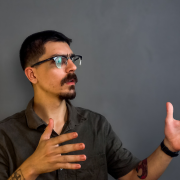
– Enrico Di Gregorio is a Brazilian journalist. He currently writes for A Nova Democracia and contributed this article to The Palestine Chronicle.

